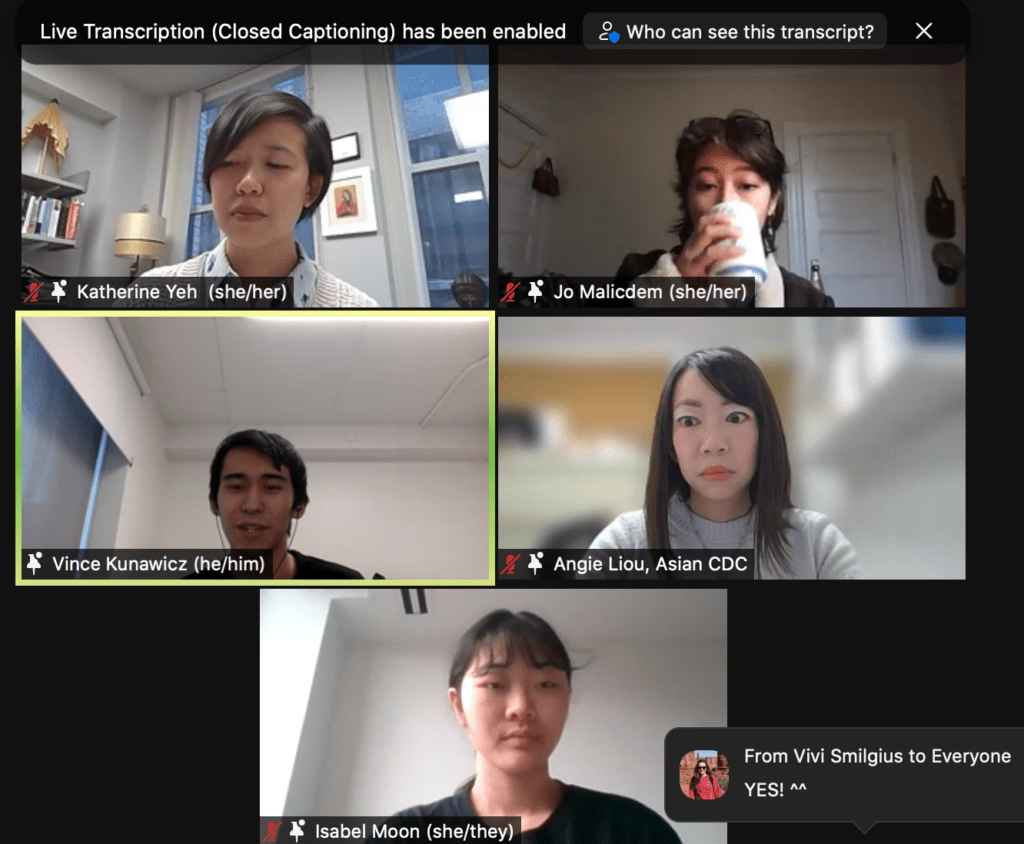Teach-In on Race: Combating Anti-Asian Hate
With anti-Asian incidents on the rise since the start of the pandemic, this year’s Teach-in on Race began with a panel addressing anti-Asian hate and how to combat it.
The panel, held Thursday, October 28, included three students from Emerson’s Asian Students in Alliance (A.S.I.A.) organization: Isabel Moon, Vincent Kunawicz, and Jo Malicdem. Angie Liou, executive director of Asian Community Development Corporation (Asian CDC), joined the panel, which was moderated by Katherine Yeh ’21, administrative associate to the dean, School of the Arts.
Watch: Teach-In on Race Playlist
Malicdem said events last spring, such as the Atlanta spa shootings, brought the issue front and center for her.

“I was really forced to confront that anti-Asian hate is a real thing. That coincided with my approach to accepting my own Asian identity,” said Malicdem.
Kunawicz said he experiences anti-Asian hate in his day-to-day life. In the United States, he said, stereotypes, assumptions, and narrow perceptions of how an Asian should act are frequently presented.
Before sharing her thoughts on the topic, Liou provided an overview of the Asian CDC, which works in underserved and immigrant Asian American communities in Greater Boston to create and preserve affordable, sustainable, and thriving neighborhoods. The nonprofit also works to engage community by running several youth programs, helping to teach financial literacy, and offering first-time homebuyer education.
Since the pandemic began, the CDC has helped with basic needs for low-income families to do things like buy food and pay rent, said Liou. Some of the people are undocumented, may not speak English well, are frontline workers, or survivors of domestic violence. The pandemic also forced a lot of pre-existing help that had been in person to go online, which was then being presented primarily in English.
“Structural racism against Asians has a very long history,” said Liou. She referenced Japanese internment camps during World War II, and the Chinese Exclusion Act of 1882, which suspended Chinese immigration for 10 years and decreed that Chinese immigrants were ineligible for citizenship.
“People might not think they’re racist. But some really nice people can have microaggressions and they don’t realize that,” said Yeh.
How to Support Asian Community
The students said A.S.I.A. is a great organization that brings Asians of all ethnicities together to provide a forum for discussions about serious topics, as well as social events.
The panel was asked how to best support the Asian community at Emerson and beyond campus.
Moon suggested that non-Asian students are welcome to attend A.S.I.A. events and get-togethers.
“Just support our work. Especially the Emerson community. We’re all storytellers,” said Malicdem.
Liou suggested participating in one of the walking tours of Chinatown that teaches people about its history and culture.
She said being involved in policy advocacy also can help, particularly bill H3115 in the Massachusetts State House. The bill would ask state agencies collecting racial data to be more specific. Instead of just offering Asian, Black, Latinx, survey participants would be able to choose more specific ethnicities like Japanese, Chinese, Filipino, or others.
“We all came to this country under different circumstances,” said Liou pointing out that an immigrant may arrive as a refugee escaping a war, or may be a PhD coming for a job.
Categories